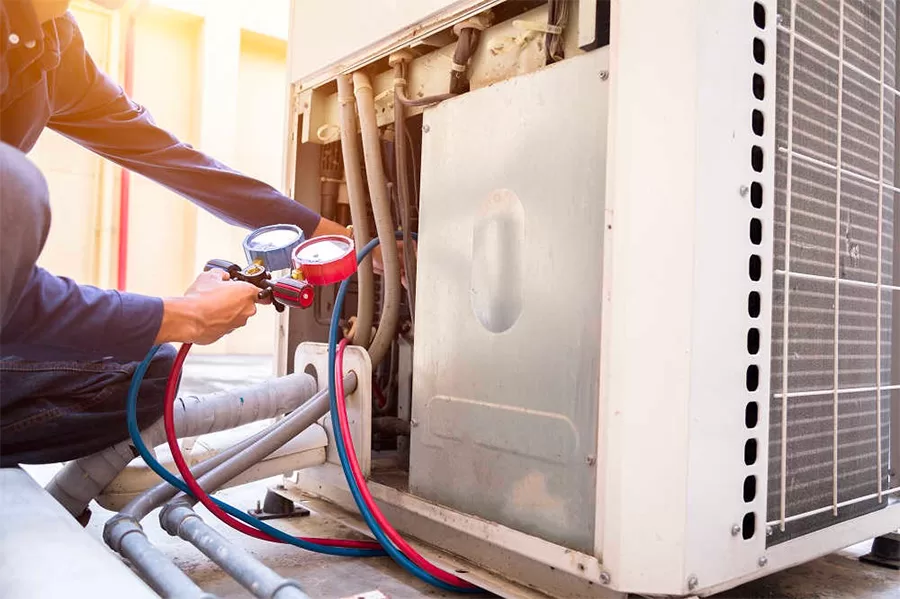In the realm of household maintenance, few systems are as crucial and potentially complex as HVAC (Heating, Ventilation, and Air Conditioning) systems. Responsible for keeping us comfortable year-round, these systems require regular upkeep to ensure they operate efficiently and effectively. Here’s a comprehensive guide on how to maintain and repair your HVAC system, keeping it in peak condition.
Regular Maintenance:
- Change Air Filters: One of the simplest yet most effective maintenance tasks is regularly changing air filters. Clogged filters restrict airflow, reducing system efficiency and air quality. Check your filters monthly and replace them every 1-3 months, depending on usage.
- Clean Vents and Registers: Over time, vents and registers accumulate dust and debris, obstructing airflow. Regularly vacuum and wipe them down to maintain optimal airflow throughout your home.
- Inspect and Clean Outdoor Unit: The outdoor unit, often the condenser, can become clogged with dirt, leaves, and other debris. Keep the area around it clear and use a garden hose to gently clean the unit, removing any buildup to maintain proper airflow.
- Check Thermostat Settings: Ensure your thermostat is programmed correctly for your comfort and energy efficiency. Consider upgrading to a programmable or smart thermostat for better control and energy savings.
-
Schedule Professional Maintenance:
- While many tasks can be handled by homeowners, scheduling annual professional maintenance is essential. HVAC technicians can perform thorough inspections, identify potential issues, and tune up your system for optimal performance.
Common Repairs:
- Refrigerant Leaks: Low refrigerant levels can indicate a leak in your system. Only certified technicians should handle refrigerant repairs due to their complexity and potential environmental impact.
- Faulty Capacitors: Capacitors are responsible for starting the motors in your HVAC system. If your system struggles to start or makes unusual noises, a faulty capacitor could be the culprit. A technician can replace it swiftly to restore proper functionality.
- Clogged Drain Lines: Over time, drain lines can become clogged with algae, mold, and debris, leading to water leaks and potential water damage. Regularly flush the lines with a mixture of bleach and water, or contact a professional for a thorough cleaning.
- Electrical Issues: Electrical problems can manifest in various ways, from inconsistent cooling to complete system failure. Faulty wiring, blown fuses, or tripped breakers may require professional diagnosis and repair to ensure safety and proper operation.
- Compressor Failure: The compressor is the heart of your HVAC system, responsible for circulating refrigerant and maintaining desired temperatures. If your system fails to cool properly, compressor issues may be to blame, necessitating professional repair or replacement.
Tips for Efficiency and Longevity:
- Invest in Regular Maintenance: Proactive maintenance not only prevents costly repairs but also extends the lifespan of your HVAC system, saving you money in the long run.
- Seal Ductwork: Leaky ducts can result in significant energy loss and reduced system efficiency. Seal ductwork with foil tape or mastic sealant to improve airflow and efficiency.
- Upgrade to Energy-Efficient Equipment: Consider upgrading to ENERGY STAR-certified equipment for increased energy efficiency and lower utility bills. Modern HVAC systems offer advanced features and improved performance, making them a worthwhile investment.
- Practice Energy-Saving Habits: Simple habits such as adjusting thermostat settings, using ceiling fans, and sealing windows and doors can further enhance energy efficiency and reduce strain on your HVAC system.
By following these maintenance and repair guidelines, you can ensure your HVAC system operates smoothly, efficiently, and reliably throughout the year. Remember, while some tasks can be handled independently, always enlist the help of certified professionals for complex repairs and maintenance procedures to safeguard your system and your home.




